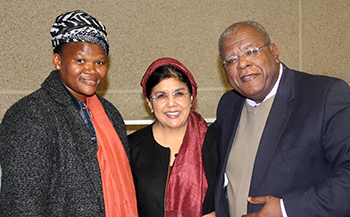Latest News Archive
Please select Category, Year, and then Month to display items
02 January 2025
|
Story Gerda-Marie van Rooyen
|
Photo Supplied
 Leading the research in South Africa is Prof Linus Franke from the Department of Soil, Crop and Climate Sciences.
Leading the research in South Africa is Prof Linus Franke from the Department of Soil, Crop and Climate Sciences.
Scientists are actively pursuing the successful breeding of diploid hybrid potatoes from inbred lines. This is expected to revolutionise potato breeding as it holds the key to rapid genetic progress. It will introduce new varieties for commercialisation through seed. Currently, existing potato variants have a gene that renders self-pollinated seeds infertile.
Prof Linus Franke, an academic in the Department of Soil, Crop and Climate Sciences at the UFS, is leading the research in South Africa. “This technology allows the production of genetically uniform potato seed that is easy to transport and largely disease-free.” He says this differs from conventional breeding whereby only vegetative propagation is possible due to tetraploid varieties in potatoes. It also risks carrying pests and diseases from one generation to the next – leading to the accumulation of pests and diseases with each round of multiplication.
Seed innovation
Prof Franke explains that Solynta BV, a seed company based in the Netherlands that produces potato varieties that can be grown from seed, has included South Africa in their research efforts because it is one of Africa’s largest producers and exporters. Through his academic relationship with Wageningen University and Research, a Dutch institution renowned for its agricultural endeavours and food production, the UFS became involved in researching hybrid potatoes grown from seed.
Diploid seeds containing two sets of chromosomes allow easier gene manipulation to increase predictability and speedier genetic progress. The breeding approach enables the incorporation of tolerance to pests, diseases, abiotic stresses (cold, heat, drought) and other desired genetic traits.
Although Prof Franke is optimistic about this research, he is not blind to disadvantages. “Potato seeds are tiny and have little energy reserves, making it harder to grow potatoes from seed than from tubers.” He says potatoes from seed will take longer to cultivate than tubers, as farmers need to grow plantlets from seeds first, adding six weeks to the growing period. “It is possible that commercial farmers can grow potatoes directly from seed. Alternatively, perhaps more likely, specialised growers will produce tubers of potatoes from seed; these tubers are then sold as seed tubers to other potato farmers, who then continue their normal practices of producing potatoes for the market from tubers.”
Financial benefits
Prof Franke says farmers have reason to get excited. “Seed potatoes will reduce input costs, as varieties with enhanced tolerance to pests and diseases require less pesticides. Planting one hectare of potatoes requires three to four tonnes of potato tubers, but only one 25 g packet of potato seeds.” Since potatoes are a more valuable commodity than maize, this technology might also increase farmers’ income potential.
Beauty personified through written word
2016-07-29

Dr Thozama April, University of Fort Hare
historian, Zubeida Jaffer, current Writer-in-Residence
in the Department of Communication Sciences
at the UFS and author of Beauty of the Heart:
The life and times of Charlotte Mannya Maxeke
and Prof Jonathan Jansen, Vice-Chancellor and Rector
of the UFS at the book launch of Zubeida Jaffer.
Photo: Rulanzen Martin
“It is quite easy to write a book in a professional capacity but very difficult to write a book from the heart.”
These were the words of Prof Jonathan Jansen, Vice-Chancellor and Rector of the University of the Free State (UFS), at the launch of Beauty of the Heart: The life and times of Charlotte Mannya Maxeke by Zubeida Jaffer, the current Writer-in-Residence in the Department of Communication Sciences at the UFS.
Perseverance and dedication yields results
Writing a book from the heart is exactly what Jaffer, an award-winning South African journalist and author, set out to do. “When you make the choice to write a story, you need to be very dedicated,” she said.
As this is Jaffer’s third book, one would think that she would have no difficulty in putting pen to paper. On the contrary, she mentioned that it was, in fact, the hardest book she has written because the narrative was not easy to get hold of.
“I wanted Charlotte’s voice to come through, and it took my team and I three years of research and writing,” she said.
Maxeke’s story helps to shape South African society
The three-person panel, hosted by the UFS Sasol Library and SUN MeDIA, and chaired by Prof Jansen, included Jaffer and Dr Thozama April, University of Fort Hare historian who had done her PHD thesis on Maxeke.
Dr April said that Maxeke’s life story is an inspiring one, as it encourages a rethinking of established narratives. “These established narratives have made it possible for historians and researchers to write about the shaping of South African society,” she said.